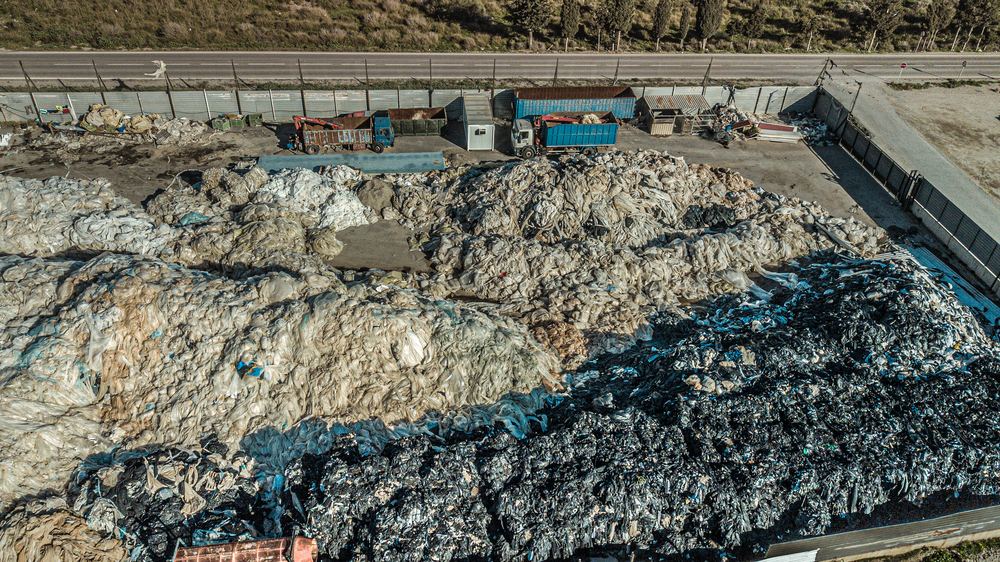MOEBIOS: Improving waste management of biobased plastics and the upcycling in packaging, textile and agriculture sectors.

MOEBIOS is an innovative project focused on improving bioplastics waste management in Europe. It aims to create new recycling value chains for bioplastics from packaging, agriculture, and textile industries, transforming them into high-quality end-products. The project will be implemented in real industrial recycling lines, prioritizing bioplastics for which recycling processes are not yet established. It will involve a wide range of stakeholders within a multiactor approach, including waste producers, managers, industry, authorities, and citizens, to foster a collaborative innovation environment.
Context
The production of bioplastics is expected to increase dramatically, from 2.2 million tonnes in 2022 to 7.43 million tonnes by 2028. However, current recycling systems are not prepared to handle this growth, especially for bioplastics other than PLA, which currently accounts for 20% of the bioplastics market.
In the packaging sector, which represents 39.5% of all plastics conversion in the EU27+3, bioplastics are often collected with conventional plastics, making recycling difficult. Additionally, existing biodegradation processes are not optimized for current bioplastics. Furthermore, there is no technology in place to generate food-grade recycled bioplastics in sufficient quantities.
In the textile industry, synthetic textiles account for two-thirds of the 11 kg of textiles discarded per person annually in the EU. While 92 million tonnes of textiles are discarded globally each year, only 0.33 million tonnes are biopolymers. Recycling of synthetic fibers is not observed at scale.
In agriculture, the use of biobased plastics is 8%, while recycled plastic content in agriculture applications is less than 22%. Despite the potential for bioplastics to be treated with organic waste in anaerobic digestion plants, they often end up in landfills due to deficient management practices, misinformation, and lack of infrastructure.
Summary and objectives
MOEBIOS is an innovative project tackling the challenge of plastic pollution in Europe by revolutionizing bioplastic recycling.
The project focuses on optimizing bioplastics End of Life across three key value chains: packaging, agriculture, and textiles.
MoeBIOS will develop comprehensive solutions for sorting, conditioning, recycling and upcycling bioplastics waste streams into high-quality end-products that match or even outperform the original materials’ quality and functionality. By addressing the entire recycling process, from collection to upcycling, MoeBIOS aims to create a holistic and efficient system for bioplastic waste management, contributing to a more sustainable circular economy.
Specific objectives of the project include:
- Integrating recycling processes into existing industrial lines. Focusing on bioplastics for which recycling processes are still not in place, excluding bio-based analogues.
- Development specific sorting systems for bioplastics in three different waste streams: packaging, textile and agriculture waste
- Advancing mechanical waste recycling systems for bioplastics.
- Developing improved enzymatic systems degrading bioplastics as the basis for subsequent bio-recycling.
- Optimising chemical waste recycling systems for bioplastics.
- Developing a thermo-chemical recycling method for obtaining syngas from the bioplastic waste streams that cannot be valorised through any of the previous methods.
- Developing new scaled-up recycling routes for bioplastic waste streams under the premises of real waste management plants.
- Upcycling the obtained materials through the recycling processes to produce three final demonstrators: packaging, textile, and agricultural and gardening applications.
- Developing a decision support system for waste managers on the recycling strategy to be followed for bioplastics contained in each of the waste streams.
- Ensuring the safety of every process and product regarding human health and sustainability from the very early stages. establishing and following Safety- and Sustainability-by Design (SSbD) criteria, environmental, economic and social impact through LCA, LCC and s-LCA analysis
- Engaging a diverse range of stakeholders through a multi-actor approach and transdisciplinary methodology.
- Developing a comprehensive campaign to assess the social acceptance of the project’s outcomes to successfully deploy the end-products in the market and the recycling processes in the industry.
Consortium
- INSTITUTO TECNOLOGICO DEL EMBALAJE, TRANSPORTE Y LOGISTICA (Paterna, Spain) | Project Coordinator
- NOVIS GMBH (Tubingen, Germany)
- NOVAMONT SPA (Novara, Italy)
- SARABIA PLASTICS SL (IBI, Spain)
- ALIA SERVIZI AMBIENTALI S.P.A. (FIRENZE, Italy)
- TRANS SABATER SL (RIBARROJA DEL TURIA, Spain)
- TOTALENERGIES CORBION BV (Gorinchem, Netherlands)
- NEXT TECHNOLOGY TECNOTESSILE SOCIETA NAZIONALE DI RICERCA R L (Prato, Italy)
- GREENE W2H2 SL (ELCHE, Spain)
- ESTUDIOS, DIRECCION E INVESTIGACION DE FERMENTACIONES ESPECIALES SA (SEVILLA, Spain)
- PICVISA MACHINE VISION SYSTEMS SL (Calaf Barcelona, Spain)
- SOCIETE D EXTRUSION DU POLYETHYLENEA BARBIER ET CIE (Sainte Sigolene, France)
- CENTRE TECHNIQUE INDUSTRIEL DE LA PLASTURGIE ET DES COMPOSITES (Bellignat, France)
- EROSKI SCOOP (Elorrio, Spain)
- ZERO EMISSIONS ENGINEERING BV (Delft, Netherlands)
- ABONOS ORGANICOS SEVILLA SA (SEVILLA, Spain)
- ASA SPEZIALENZYME GMBH (Wolfenbuttel, Germany)
- GREENE ENTERPRISE, S.L. (Elche, Spain)
- AUZO LAGUN S. COOP (ARRASATE MONDRAGON, Spain)
- ACONDICIONAMIENTO TARRASENSE ASSOCIACION (Terrassa, Spain)
- EUROPEAN BIOPLASTICS EV (BERLIN, Germany)
- CHEMOSVIT FIBROCHEM SRO (Svit, Slovakia)
- EURO-FUNDING EU PROJECTS SOCIEDAD LIMITADA (Madrid, Spain)
ITENE’s role
The MOEBIOS project work plan consists of seven interconnected work packages, with ITENE as the Project Coordinator.
In addition to this coordinating role associated with WP7, ITENE will lead WP2: Novel technologies for enhancing biobased plastics waste recycling, with the following objectives:
- Develop and optimize, at TRL4 (Technology Readiness Level 4), ideal recycling methods for each waste stream scenario and sector. Implement an enzymatic discovery pipeline that leads to potential enzyme candidates for bio-recycling. Validate and demonstrate enzyme production at pre-industrial scale.
- Study and scale up to TRL 6/7 (1/100 of industrial scale) each recycling route, validating its compatibility with real recycling and waste management plants.
Beyond leading WP2, ITENE will also contribute to WP3: Development of demonstrators based on r-biobased plastics, and will have a very relevant contribution in WP5: Sustainability, Safety and Techno-Economic Assessment.

